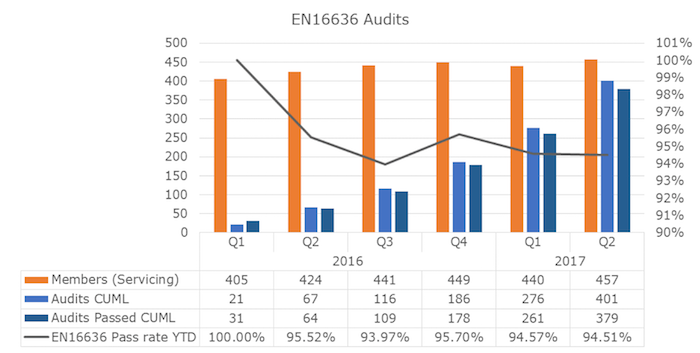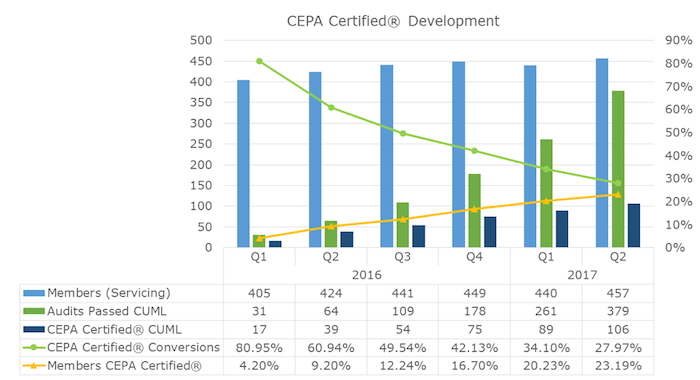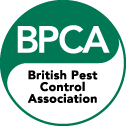Leading the pest management sector by promoting professional standards
Success achieved
Leading the pest management sector by promoting professional standards.- Website
- https://bpca.org.uk
- Project dates
- June 2016 - 2017
Project team
- Simon Forrester, Chief Executive
- Ben Massey, Marketing and Communications Manager
- Scott Johnstone, Content and Communications Officer
- Dee Ward-Thompson, Technical Manager
- Lauren Day, Events Manager
Tools & Systems
A key element of the accreditation was the fact that BPCA members who achieve CEPA Certified® status would be independently assessed by qualified and experienced auditors with an in-depth working knowledge of the industry.
Audits validate practices to a clear professional standard to ensure activities are delivered safely, effectively and within European and national regulations. BPCA were adamant that the process did not become a simple box-ticking exercise.
Past research looking into other organisations revealed to BPCA that internal audits could be weakened by pressure to allow companies to pass.
As a result, the BPCA opted for each member to be independently assessed by Bureau Veritas, the global certification body - the only UK organisation that does this.
By using third party verification, the view was that clients can be sure audits are legitimate and that every BPCA member company is held to the same high standard.
Introduction
In March 2015, the European quality standard for pest management services was released. The standard, EN 16636, developed by The Confederation of European Pest Management Associations (CEPA), specifies the requirements for the provision of the effective and economical reduction of damage caused by pests. The aim is to protect public health, property and the environment.
BPCA recognised that if our members could reach this standard (becoming “CEPA Certified®”) it would give us the perfect opportunity to showcase the professionalism of our membership.
BPCA understands many pest controllers are untrained and do not stay up-to-date with the latest products, techniques and legislation - something which can create significant problems for members of the public and the profession.
Through the standard, BPCA has an effective voice to align with, ensuring the association remains the mark of professionalism in UK pest management. The EN 16636 standard provides a clear incentive for clients to look for the BPCA logo every time they select a pest management company.
To ensure a clear and consistent approach, it was agreed that BPCA would introduce rules requiring every member company to be assessed against the new standard.
This meant that all BPCA servicing members needed to have been independently audited to the standard by the summer of 2017.
It is a remarkable achievement that this goal has been met, with certificates issued and company details uploaded onto the CEPA database of certified providers to show competence and a demonstration of conformity to the requirements of EN 16636.
As a result, BPCA now remains the only trade body in the world to audit all member companies against this standard. When you combine this audit with the requirement that all associated technicians are professionally qualified and enrolled onto a continuous professional development schemes – we can say with confidence BPCA member companies are the best of the best.
BPCA members are audited to the professional standard for pest management and their employees are up to date with the latest products, techniques and legislation.
Discovery
This campaign was a key element of BPCA CEO Simon Forrester’s root and branch review of the Association’s governance, stemming from 2016.
The focus of his work has been to prompt revisions which will lead to a stronger, more streamlined structure.
We began by talking to key specifiers at industry events. We wanted to get to the root of what the end-user was looking for in their pest control supplier.
We spent a lot of time working with the Executive Board and our associated committees, working out what they wanted out of their membership. They want to know they could distinguish themselves from non-professional, non-member pest management companies.
Objectives
By meeting the standard, BPCA members are on a level playing field with the best pest management companies in the world. That will mean that, by employing them, businesses and individuals can be totally confident of a professional service.
Objectives include:
- As the first common standard for pest management operators, certification to EN 16636 demonstrates the professional credentials of an organisation against a European benchmark for pest management
- The achievement of third-party independent verification
- Contributing to standardising the public health and food safety industry with verification to an internationally recognised, professional standard
- Building supply chain confidence and enhancing members’ competitive benefit with this recognised mark of quality
- Maintaining members’ certification with regular assessments on an 18-month cycle
- Growing members’ business with a recognised brand which is setting the level of industry standards.
Activities
Back in 2009, BPCA with their sister Associations across Europe, began to develop EN 16636 – the European Standard for professional pest management. Considerable resources and expertise from our Staff team were lent to the Confederation of European Pest
Management Associations (CEPA), so that the Standard could be both adequate for all end users and palatable for our membership base.
Animal welfare campaigners, end-users, global brands, associated industries and regulators were all consulted to ensure that EN 16636 was palatable and a sellable asset when BPCA and CEPA came to launch it.
In 2011, the protocol for the measurement of the EN 16636 Standard was developed by CEPA, again with a considerable input from the BPCA team. The CEPA Certification scheme sets out how to measure the Standard. It incorporates everything from qualifications, documentation and generally the hoops all companies must jump through to achieve the Standard.
In March 2015, the European quality standard for pest management services and the CEPA Certified scheme were released. The standard, EN 16636, specifies the requirements for the provision of the effective and economical reduction of damage caused by pests with an aim to protect public health, property and the environment. The CEPA Certified Scheme gives those companies who achieve the standard the ability to say that they are certified to EN 16636 Standard by CEPA.
A database of CEPA Certified providers was created to demonstrate the conformity to the requirements of EN 16636.
BPCA created a close partnership with Bureau Veritas, a global leader in Testing, Inspection and Certification (TIC) services. BPCA needed an independent third party with experience in delivering high quality audits to professional standards. BV were charged with auditing all BPCA members to the EN 16636 standard and then certifying them (if that’s what the member wanted).
BPCA assisted BV with sourcing high-quality, experienced auditors with expert knowledge in pest management to conduct the audits. BPCA to this day, still helps BV find the best auditors in the industry so members can be assured they’re getting someone who really knows their business during their audit.
In 2015, we started to tell our members that they were going to be audited to the EN 16636 standard and that they’d have the option to go for CEPA Certification. This included magazine articles, talks at our events and our email newsletter. A document with examples of magazine and newsletter articles is provided in the Related Files section.

The target was to have every servicing member audited to the standard in the next 18 months.
18 months later and all members are now audited to the EN 16636 Standard. To mark this achievement BPCA started their “Be Protected. Professionally.” campaign to educate end-users about how the only BPCA members are audited to the European Standard in pest management.
The BPCA Staff team are now out and about talking to specifiers, supermarket chains, hospitality companies, associated industry trade associations, local authorities and even hospitals talking about the benefit of choosing a BPCA member audited to the EN 16636 Standard.
The heart of the BPCA website – the “Find a Pest Controller tool” was upgraded with the “Be Protected. Professionally.” branding and messages.
Innovation
The BPCA now remains the only trade body in the world to audit all member companies against this EN 16636 standard and requiring qualifications, plus CPD, to ensure allied technicians are up to date with the latest products, techniques and legislation.
Marketing
Our marketing centred around membership communications, dialogue with key partners and PR to the wider public. BPCA’s own in-house magazine, Professional Pest Controller, also carried news and features about the standard to help give members an insight into the new approach.
A high-profile platform for promotion was achieved through the inaugural British Pest Management Awards. These were held as part of the BPCA PestEx conference, in March this year. They highlighted and rewarded the work of members who achieved the standard.

A variety of media coverage was also secured regarding the standard, providing BPCA with a unique message to promote its professionalism to a wide-ranging audience.
A link to the BPCA CEPA/EN 16636 website is also included, which sets out the message to both members and also gives an indication of the benefits of the standard to key audiences.
BPCA has also started the “Be protected. Professionally” campaign. The aim is to show the marked difference between a BPCA member and the competition. This includes what the member logo means and what the EN 16636 standard means. This is the voice in which we talk to pest management consumers.
The campaign has a print flyer to be distributed by BPCA and its members, plus the key messages are embedded into the Association’s “Find a pest controller tool” referral tool – so the public really know what they’re choosing when they pick BPCA. The flyer is attached to this nomination.
Challenges
BPCA initially received resistance from the membership when they were told that they would have to go through a more detailed auditing process than they had been used to (informal visits from the BPCA Staff team).
BPCA tacked the core belief that audits are something negative that are “done to them”. Instead we tried to frame the audit as a membership benefit and an opportunity for members to benchmark themselves against companies of all sizes around Europe.
Support was provided to all members across many communications and events around the UK.
Although there was initially a large resistance, only two companies resigned from BPCA.
Achievements
Our object for all BPCA servicing members to have achieved the standard by the summer of 2017 has been achieved. Certificates are issued and company details uploaded onto the CEPA database of certified providers to show competence and a demonstration of conformity to the requirements of EN 16636.
Targets & Statistics
All servicing members were audited by June 2017.


What would we do differently?
We would have worked with sister associations in Europe in a coordinated campaign so they could have been as successful as us.
Feedback & Testimonials
“The EN16636 Standard is a mark of quality, so the fact we’re the first to be accredited in Lancashire is a feather in our cap.
It’s very important for us to demonstrate our professional status and achieving this accreditation provides independent proof of that.
It was a lot of hard work to achieve it because the auditing process was tough, but we’re members of the British Pest Control Association (BPCA) and they steered us in the right direction. We believe it will be worth the effort in the end.”
Martin Harvey, Managing Director, Harvey Environmental
“Nestlé, in line with several other food and drink manufacturers, welcomed the creation and release of EN 16636, recognising the valuable contribution it makes in promoting adherence to standards of professionalism and enhancing Integrated Pest Management principles within the Pest Management Industry.”
Dr Ferenc Varga, Microbiological Safety and Hygiene Expert, Nestlé Quality Assurance Centre


